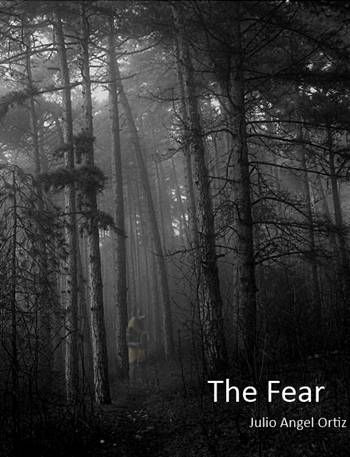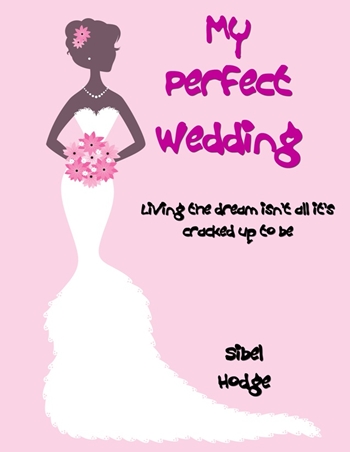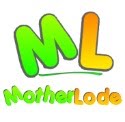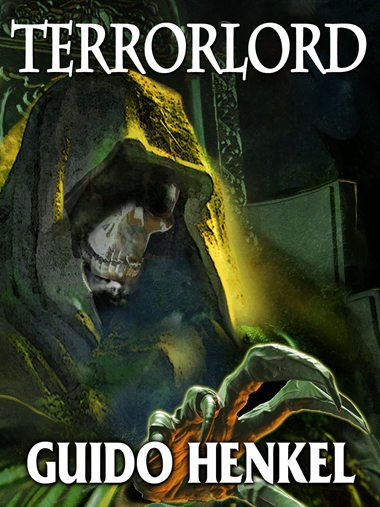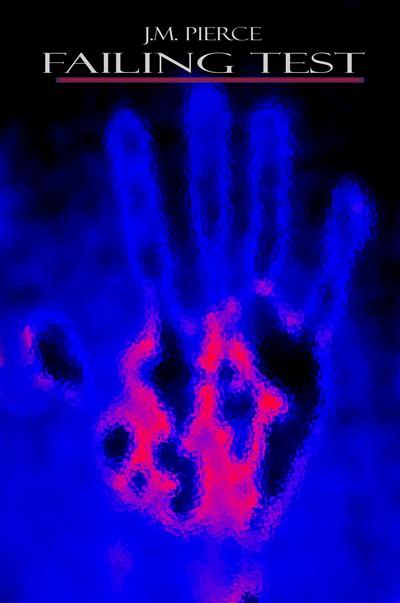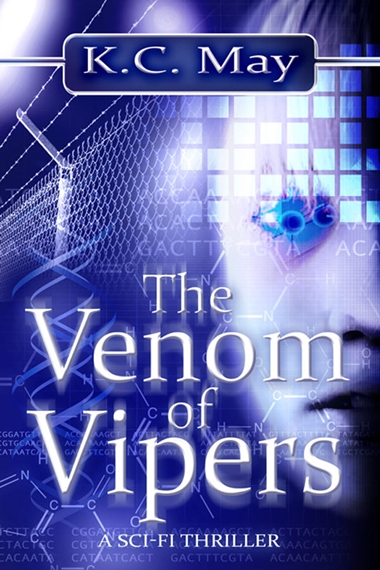
“For instance, I wanted to give Ryder a moral dilemma — one that had no right or wrong answer. To make it harder for him, I put him in a situation where his two choices deeply affected him personally. The story builds around that.”
K.C. May 26 January 2011
The Back Flap
A supervirus threatens to wipe out the human population.
The only hope for the future is a cure hidden inside Ryder Stone. Created in a lab and brutalized, betrayed and hated by humans, Ryder yearns for freedom. On the outside, a group of human genetic purists want him dead.
When Katie Marsh, a brilliant young geneticist, discovers his secret, she must fight to protect Ryder, gain his trust…and convince him to save humanity before the purists destroy them both.
About The Book
What is the book about?
The Venom of Vipers is about humanity and what it’s really all about. I introduce a new human subspecies, homo sapiens heredis (saphers for short), that’s designed to take over as stewards of earth once the last of our species has died from the horrible virus that has swept the globe.
At the time of the story, there are only a couple thousand of them world-wide, housed in genetic research facilities partly to keep them safe from the humans who would do them harm. The problem is that the females can’t carry a pregnancy to term, which doesn’t bode well for their survival once there are no more human surrogates.
Ryder Stone is an artistic 32-year-old with a 14-year-old daughter who’s the farthest along in her pregnancy than any other sapher, and Katie Marsh joins the staff at the research center to discover why and try to use that information to help the other females finish their pregnancies. The clock is ticking– humans are dying out with no cure for the virus in sight, and saphers need to be able to reproduce on their own if they’re to carry on when we’re gone.
Ryder discovers he can cure humans afflicted with the virus. He’s faced with a dilemma: does he make that information public or keep it secret?
When did you start writing the book?
I first got the idea that started the story in the late 1990s, but I didn’t start actively writing until the spring of 2009.
How long did it take you to write it?
I wrote 90% of the first draft in 2009, but then I decided to move across country from Arizona to Georgia. The story got put on hold for about six months, but that time gave me some much needed distance to solve some plot issues that had been plaguing me. Plus, I didn’t know exactly how to end it, so the first draft never got a proper ending.
Where did you get the idea from?
Science News magazine. If you’re not familiar, it’s a weekly publication with articles written for the “knowledgeable layperson.” One article was about the similarities between human hemoglobin and crocodile (or was it alligator? Now I can’t remember). I thought there was a science fiction story in that somewhere, and my mind started churning.
Were there any parts of the book where you struggled?
Yes! Pretty much the entire story. I had a ton of research to do because I didn’t understand how viruses worked, I needed to work out why and how we would need to create a subspecies that was different enough from us to stir fear or hatred in the hearts of our most zealous citizens, and I didn’t know how I was going to end it. I had two basic choices: happy or miserable.
What came easily?
Writing Ryder’s character came more easily than any other aspect of the story. I gave him a lot to care about then threatened to destroy it all. Some of the back story came easily, especially where Henry was concerned. I’d even written a short story showing how he and his late wife had first engineered the saphers.
Are your characters entirely fictitious or have you borrowed from real world people you know?
As far as I know, they are all entirely fictitious except for Henry, who is based loosely on my dad (rest his soul).
We all know how important it is for writers to read. Are there any particular authors that have influenced how you write and, if so, how have they influenced you?
There are some writers whose writing I adore, such as Robin Hobb and Brandon Sanderson, but their styles are vastly different from my own. As much as I’d like to write more like them (insofar as prose style is concerned), I don’t think I’m wired that way. When I look at prose styles and story layout, I have to wonder whether George R.R. Martin’s style influenced me. He moves from one character’s POV to another, and I quite enjoy that as a reader. I’m not one who wants or needs to stay in a single character’s head the entire story, so I rarely write in first person.
Do you have a target reader?
For this story, I thought my main audience would be men over 30, but it turns out that women like it as well. I didn’t load the story up with hard-core science — it’s more a light sci-fi with thriller tendencies than a hard sci-fi. My target reader is like me: somewhat interested in science without being a hard-core geek, preferring that stories focus on the human element.
About Writing
Do you have a writing process? If so can you please describe it?
Not really, no. I’m a fairly undisciplined writer. I make a few notes about my main character and let him or her evolve through the problems I throw at him. For instance, I wanted to give Ryder a moral dilemma — one that had no right or wrong answer. To make it harder for him, I put him in a situation where his two choices deeply affected him personally. The story builds around that.
Do you outline? If so, do you do so extensively or just chapter headings and a couple of sentences?
I used to be a heavy outliner, but I’ve moved away from that and toward a heading/notes and multi-draft approach. There are some scenes I write several different ways then choose later which one works best. Once the first draft of the story is done, I revise two or three times. For my debut novel, The Kinshield Legacy, I found that I needed to start over because I didn’t get it right. Trying to fix what I had was too confusing. I ended up writing that book three times from scratch, then revising the third draft a few more times.
Do you edit as you go or wait until you’ve finished?
I wouldn’t say I edit as I go. I often revise as I go, though. If I’ve decided to do something differently in order to get my characters from point B to point C, I can’t move on from there until the journey from point A to B is set properly. If I spot a typo, I’ll fix it, but I don’t try to tweak the phrasing or choose the best word until the story elements are all in place the way I want them.
Did you hire a professional editor?
No. I’m probably going to write a blog article about that topic sometime soon. Most indie authors (including me) could use the help of a developmental editor as well as a copy editor. A developmental editor helps with story structure, pacing, and so forth (this is not the same as a critique partner). A copy editor helps with the words on the page to make sure they flow well and everything’s grammatically correct. I don’t know of any experienced developmental editors available on a free-lance basis. Most people I’ve seen offering their services as an editor are copy editors (and many writers need a good copy editor). For writers with a strong grasp of grammar and spelling who employ the use of various self-editing techniques, a copy editor can be almost superfluous. Instead, I used a proofreader on my final draft to catch the three or four errors I’d missed. That said, I highly value my critique partners and beta readers. They aren’t developmental editors, but they are readers who tell me what works for them and what’s still rough. I use that information to adjust the story to get the effect I want.
Do you listen to music while you write? If yes, what gets the fingers tapping?
Not generally, but sometimes I enjoy listening to instrumental music. If there are lyrics, I tend to get distracted and want to sing along. Loreena McKennitt is a favorite.
About Publishing
Did you submit your work to Agents?
The Kinshield Legacy was originally published by a small press, and I had an agent for that. I did query my original agent about The Venom of Vipers, but I didn’t get a timely response, so I went ahead with my plans to self-publish it.
What made you decide to go Indie? Was it a particular event or a gradual process?
It was an ah-ha moment. After I got the rights back to The Kinshield Legacy, I was deciding whether to shop The Kinshield Legacy around to other publishers or put it out to pasture when it occurred to me that I could format it for the Kindle and re-release it. I’ve really enjoyed the process and control of self-publishing. With the publishing industry in flux, I decided not to spend years waiting to see if anyone would be interested in The Venom of Vipers. I figured I could start building a readership on my own. If a publisher takes interest in a new book down the road, I can evaluate what my best course of action is then.
Did you get your book cover professionally done or did it you do it yourself?
I wish I had the artistic talent and skill to create a nice cover. All of my covers were done by cover artists.
Do you have a marketing plan for the book or are you just winging it?
I’m learning as I go. What works for one writer may not work for me, but I’ve found a few things that have definitely worked and a few that have definitely not worked.
Any advice that you would like to give to other newbies considering becoming Indie authors?
Write a good story and polish it to a brilliant shine. Nobody wants to spend money on a product that fails to meet expectations. If your book is engaging and well-written, readers will find it, spread the word and look for more of your stories.
About You
Where did you grow up?
I grew up in the Midwest and in Hawaii. After high school, I went to Boulder, Colorado for my freshman year, then transferred to Tallahassee, Florida to get my B.A. in Russian from Florida State University. After a year in Taiwan learning Mandarin and teaching English, I moved to Phoenix, Arizona and spent 24 years there.
Where do you live now?
I live near Atlanta, Georgia.
What would you like readers to know about you?
I’m kind of a geek who loves reading, dogs and football. While in Arizona, I founded a Rottweiler rescue organization, studied karate, went backpacking, tried sky-diving, did some downhill skiing, got a couple motorcycles, wrote software, and spent time on the shooting range. I also love rollercoasters!
What are you working on now?
I’m working on the sequel to The Kinshield Legacy. The advice I got back in 2005 when it was first published was not to spend time writing the sequel to a book that doesn’t sell. I had about 30,000 words written, and that advice made sense to me, so I put it away. Sure enough, it didn’t sell! (Without much marketing, only a few dozen people were willing to pay $29 for a hardcover from an unknown writer.) It wasn’t until I re-released it that it started to sell. Now readers are eager for the sequel, and I’m running behind!
End Of Interview
You can buy Venom of Vipers at Amazon, Smashwords,
B&N or ibooks. KC’s website is here.


